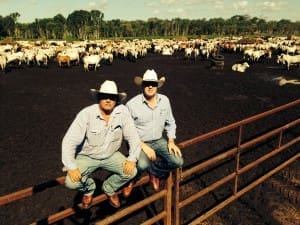
Frontier International’s Mike Garland and Tony Gooden with a consignment of export cattle in Darwin.
Prices for some export feeder steer orders from Darwin have eased below $2.00/kg liveweight for the first time since October as an emerging oversupply situation in Indonesia dampens demand for finished cattle in the market.
“It’s turned tough in a hurry” was how one experienced stakeholder described the state of play in Jakarta this week, where wet markets are said to be awash with imported beef from cold stores and from the large volumes of finished now exiting feedlots (See Ross Ainsworth’s latest SE Asia Beef report published exclusively on Beef Central today)
However there is also a sense among northern Australian sources that the return of high volume beef consumption during Ramadan/Lebaran in Indonesia from mid-June onwards could spark another lift in northern cattle prices in coming weeks.
One of the key factors cited for falling prices and weakening demand in Indonesia, as Beef Central has reported in recent months, has been the large volume of imported and low-priced boxed beef pouring into the market.
Australia is the major supplier of boxed beef to Indonesia, and shipments are currently running at more than double the volume of last year.
The increased export volumes have been triggered by the Indonesian Government’s decision to relax import regulations last November in a bid to improve beef supplies and bring down wet market prices for consumers.
Until that time, Australian boxed beef exports to Indonesia had been averaging around 2000t per month, almost all frozen product.
However, since the import rules were relaxed, monthly export volumes have more than doubled, shooting up to 6000t in November 2013, 4700t in December, 4003t in January, 6071t in February, 3047t in March, 4529t in April and 6029t in May. For the fiscal year to date Australian beef exports have totalled 47,700t, which compares to 23,700t for the previous financial year.
An Indonesian boxed beef importer told Beef Central on Monday that “quite a bit” of boxed product has also been coming into Indonesia from New Zealand and the US in recent months, but not quite as much as the imports from Australia.
“There are too many stocks currently, the beef importers are losing money as well,” he told Beef Central.
Frontier International sales and marketing manager Tony Gooden, who is in Indonesia on a regular basis, said the volume of cheaper boxed beef now available in the market was making it difficult for lot feeders to sell finished cattle that are now in slaughter-ready condition.
‘A lot of feedlots are now blocked up and they’re just not moving the numbers they need’
“A lot of feedlots are now blocked up and they’re just not moving the numbers they need,” he said.
“Buyers can buy boxed product at a cheaper price, and they are blending the boxed beef with the fresh meat to sell in wet markets.”
The depressed conditions in Indonesia over the past month have resulted in reduced orders for cattle from northern Australia, and prices have slipped accordingly.
Rates quoted to Beef Central from various export industry sources this week put prices for export steers out of Townsville in the range of $1.70-$1.86/kg liveweight, depending on the order. Prices in Darwin, which typically reflect Townsville prices plus 20-25c/kg in freight, are reportedly hovering around $2/kg, ranging from a high of $2.05c/kg to $1.95 at the lower end.
However the seasonal increase in demand that is due to occur during Ramadan from mid-June could see northern cattle prices kick, some stakeholders predict.
Big volumes of cattle are scheduled to be shipped to the market in coming weeks, with a reported 15 boats set to leave from Broome, 12 from Darwin and eight from Townsville in that time.
The hope, at least, is that finished cattle will be moved out of currently-full-to-the-brim feedlots as Ramadan triggers improved demand and prices for slaughter-ready cattle in the next few weeks, which will then make room in feedlots for the next wave of feeder cattle about to be sent.
Northern Territory Livestock Exporters Association chief executive officer Ben Hindle said feeder steer prices could kick again by 10c/kg as feedlot space starts opening in coming weeks.
He said that while a lull was likely to occur in export volumes to Indonesia in the third-quarter post-Ramadan, the industry expected to see significant volumes recommence in the fourth quarter.
